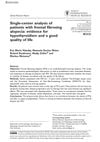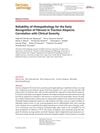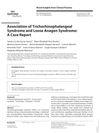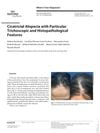Search
for
Sort by
Research
750-780 / 1000+ resultsresearch Long-Term Effectiveness and Safety of Dutasteride Versus Finasteride in Patients With Male Androgenic Alopecia in South Korea: A Multicentre Chart Review Study
Dutasteride is more effective than finasteride for long-term hair growth in men with androgenic alopecia.

research Single-Center Analysis of Patients with Frontal Fibrosing Alopecia: Evidence for Hypothyroidism and a Good Quality of Life
Frontal fibrosing alopecia is linked to hypothyroidism but doesn't affect quality of life.

research Reassessing Frontal Fibrosing Alopecia
Frontal Fibrosing Alopecia is a slowly progressing hair loss condition, likely underdiagnosed, with ineffective treatments, needing more research to understand it fully.
research Acne Necrotica (Varioliformis) – Case Report
A rare skin condition causing scarring was successfully treated with topical erythromycin and benzoyl peroxide.

research Telemedicine Alopecia Assessment: Highlighting Patients With Skin of Color
Telemedicine is effective for diagnosing hair loss, especially in people with darker skin, during the pandemic.

research Hair Loss in Women: A Study at Sheffield Royal Infirmary (1959-1966)
Hair loss in women often doesn't follow a pattern, isn't linked to age, may be genetic, and can be related to thyroid issues or other health factors.

research Hair Pathology
Triple horizontal scalp biopsies are 98% accurate in diagnosing hair loss, better than single biopsies.

research Correlation Between Androgenic Alopecia and Coronary Artery Disease Severity on Coronary Angiography Among Young Males in Central India
Hair loss in young men in Central India is linked to severe heart disease.

research Correlation Between Sebum Level and Severity of Male Androgenetic Alopecia
Higher sebum levels are linked to more severe male baldness.

research Trichoscopic Evaluation of Frontal Hairline Recession in Egyptian Female Patients
Trichoscopy helps diagnose hairline recession causes in Egyptian women, with androgenetic alopecia being the most common.

research Investigating Alopecia Areata and Its Connection to the High-Mobility Group Box 1: Review Article
Alopecia areata causes patchy hair loss and involves immune system disruptions.

research Reliability of Histopathology for the Early Recognition of Fibrosis in Traction Alopecia: Correlation with Clinical Severity
Histopathology is not reliable for detecting early fibrosis in traction alopecia or for showing how severe it is.

research Correlation of Trichoscopic Findings with Severity in Androgenetic Alopecia
Trichoscopy effectively diagnoses and assesses the severity of androgenetic alopecia.
research Correlation Between Trichoscopic Findings and Disease Severity in Female-Pattern Hair Loss
Trichoscopy is essential for early detection and monitoring of female-pattern hair loss.

research Frontal Fibrosing Alopecia and Lichen Planus Pigmentosus: Is There a Link?
There may be a connection between Frontal Fibrosing Alopecia and Lichen Planus Pigmentosus, and more research is needed to confirm this.

research The Clinicopathological Spectrum of Preclinical Folliculitis Keloidalis with Correlation to Its Dermoscopic Features: A Cross-Sectional Analytical Study
Early detection and treatment of folliculitis keloidalis can prevent disease progression.

research Doctor, You Must Examine My Creature Collection!: A Case Report of Delusional Infestation
A man wrongly believed he had parasites, showing that delusional infestation can affect men and is often linked with other psychiatric issues, but can be treated with antipsychotics.

research Association of Trichorhinophalangeal Syndrome and Loose Anagen Syndrome: A Case Report
A family was found with both Trichorhinophalangeal syndrome and Loose Anagen Syndrome, suggesting a genetic connection.

research A New Classification of Pattern Hair Loss That Is Universal for Men and Women: Basic and Specific (BASP) Classification
The BASP classification is a detailed and accurate way to categorize hair loss in both men and women.

research Frontal Fibrosing Alopecia: Review of Recent Case Reports and Case Series in PubMed
Most patients with frontal fibrosing alopecia are middle-aged women, often have thyroid disease, and some treatments can help stabilize the condition.

research The Pioneer Factor SOX9 Competes for Epigenetic Factors to Switch Stem Cell Fates
SOX9 helps determine stem cell roles by interacting with DNA and proteins that control gene activity.

research Cicatricial Alopecia with Particular Trichoscopic and Histopathological Features
The document concludes that a woman has both Frontal Fibrosing Alopecia and Lichen Simplex Chronicus, a previously unreported combination of conditions.

research Patterned Androgenic Alopecia in Women
"Male-pattern" hair loss is common in women, especially after menopause, and doesn't always mean there's a problem with hormone balance.

research Assessment of Hair Loss: Clinical Relevance of Hair Growth Evaluation Methods
Effective hair loss assessment requires a mix of precise measurement methods.

research Frontal Fibrosing Alopecia: A Case Series of 65 Patients Seen in a Single Italian Centre
The study concluded that severity of Frontal fibrosing alopecia is not linked to how long someone has it, can start before menopause, and eyebrow loss may be an early sign.

research Oral Isotretinoin Combined with Topical Clobetasol 0.05% and Tacrolimus 0.1% for the Treatment of Frontal Fibrosing Alopecia: A Randomized Controlled Trial
Taking oral isotretinoin with creams worked better for treating a type of hair loss than creams alone.

research Frontal Fibrosing Alopecia in Asians: A Retrospective Clinical Study
The study concluded that combination therapy with topical corticosteroids and hydroxychloroquine or finasteride is effective in treating Frontal fibrosing alopecia in Asians.

research Frontal Fibrosing Alopecia: Increasing Cases and Treatment Options
Frontal fibrosing alopecia is a scarring hair loss condition mainly affecting older women, with no known cause and treatments that may help stabilize hair loss.

research A Curvilinear Relationship Between Hair Loss, Mental Rotation, and Neuroticism: A Possible Influence of Sustained Dihydrotestosterone Production
Men with moderate hair loss had the best spatial thinking, and long-term DHT might affect cognition.